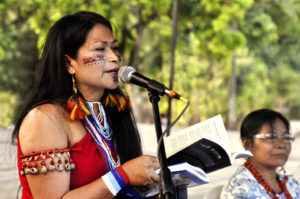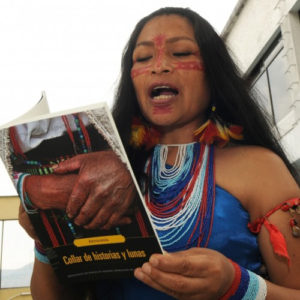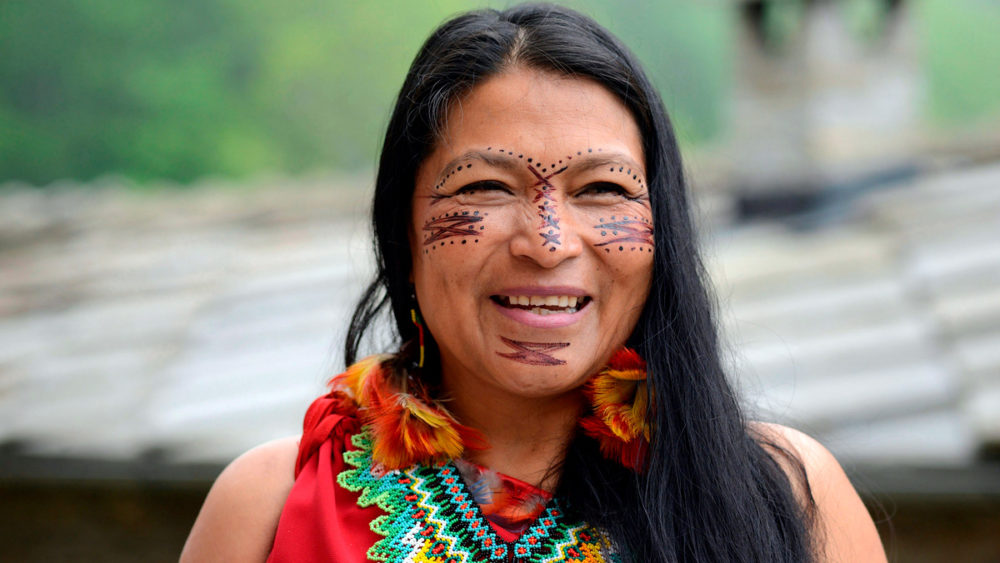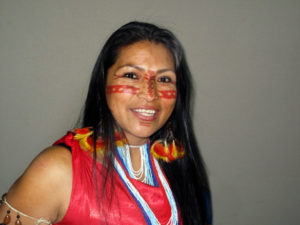“I am a myriad of emotions that wake up every day between the songs of the birds and the sunrise of Etsa, every instant is a new conquest of a new dream that Nantu brought me while I slept, when I talk to Arútam I become his favorite daughter and with the light of the star sisters I see my path from the high mountains and trees, when I conquer and transform a word and touch a leaf then there I am also the daughter of Nunkui”.
In this way, María Clara Sharupi Jua; Shuar woman, poet and proud leader describes herself.
Photograph: Cortesía de María Clara Sharupi
Despite a life with different professional and personal facets, the writer, originally from Morona Santiago, has dedicated herself from a very young age to defend and make known her mother tongue, Shuar Chicham. “Our voices bring those of our ancestors, from which we come and to which we are indebted. But also, from Arútam and Nunki, from the father who lives in the sacred waterfalls and from Mother Earth,” she adds.
This deep connection to her culture is due to her parents. From a very young age, she had a special attraction to literature and the stories of her community. This allowed her to gain the appreciation and trust of her father, a Shuar-Spanish translator for the settlers dedicated to rubber tapping (rubber tappers) in the Amazon. With him, she learned to hunt – an activity considered for men in her culture – and also the warrior spiritual strength of the Shuar.
However, her father had to leave for long periods to work in different activities, either at the request of the missionaries or to barter food, weapons, handicrafts with the Peruvians and in the company of her mother she discovered a special interest and passion for her culture and history. In recounting her story, she recalls, that when she was very young, while cooking with her mother late into the night – she listened to the Anents, Nampet, Ujaj that her mother taught her. These evoked the birds, the rivers, the gods, the sun, the moon and life; in turn, her mother, whom María Clara calls the “immortal,” told her dreams, joys, legends, anecdotes and worries in the presence of the colonizers and the missionaries.
It was in those early years of her life that she began to reaffirm the knowledge of the Shuar worldview. However, it did not last long because at the age of nine she separated from her parents to go to boarding school in Cutundo with her sister. In this school she faced mistreatment and discrimination for speaking and dressing traditionally as a Shuar woman; a situation similar to the one her father experienced years ago, when he was not allowed to register his daughter with the name Awachá (name of a shiny bluish black bird) in the Civil Registry.
“I don’t hold grudges, ignorance can hurt a lot of people,” she says. That is why, for María Clara, education is a fundamental pillar, especially with a bilingual and multicultural system. She says that in the midst of vicissitudes and far from home, she found that poetry was a means to transform anger and fear; and at the same time a means to communicate with the Shuar communities and motivate children and young people about the importance of mother tongues.
In sixth grade, being one of the best students, she won a literature award and at that moment she decided that “she would never mind being called a jíbara again” because she was proud of who she was and where she came from. While her life was slowly moving towards the world of letters, living in a shelter in Quito, she faced the death of her mother and financial difficulties. It was there, when she met Cecilia Dávila Molina from the UNICEF agency, who opened the doors of the organization to do field work in Tiwintza and Mayaik, as well as to sell Shuar handicrafts and food.
Although she wanted to study law, she entered and studied at the Universidad Politécnica Salesiana, she studied the career of local development and thanks to her knowledge of the Shuar culture, she was considered to work in the State. She formed part of the team that translated the first edition of the 2008 Montecristi Constitution into Shuar Chicham. In this way, she represented Shuar women in the National Assembly.
“I have always trusted Arútam, to render this communion with Nunkui. Although my faith has been affected, and that is when I was transformed into a swampy lake, the gods managed to make the mud flow again into a river,” says María Clara when recalling those key moments, but especially the one that changed her life, and introduced the poet to new audiences and scenarios.
In 2010, while working at the Secretariat of Migrants in Bolivia, she was researching about women and indigenous writers and Ecuador did not register any names. At the same time, the Ministry of Culture of Ecuador invited indigenous women to present their texts, among them María Clara, who together with other indigenous women authors published an anthology of poetry entitled “Amanece en nuestras vidas-Ií iwiakmarin tsawarai.”
“I wrote about everything I had ever heard in my life,” says the Shuar poet. Her poems were internationally recognized and even translated into English. In 2011, she participated in the Medellín International Poetry Festival and the Quito Book Fair. In addition, she was invited to Italy, the United States, Morocco, Mexico, Venezuela and Chile as a guest of honor by the Chilean Book Chamber.
In 2013, she returned to the festival in Medellín and felt the weight of her fame “Seeing so many Nobel Prize winners invited, I cried a lot because I wondered what am I doing here, so humble, among so many important people? I slept and asked Father Arútam to tell me what is poetry? There he was, the poet, and he told me: “Look at the sky, look at the earth, that is poetry.”
With this new strength she decided to write her own book. After several years, in 2019 the book “Tarimiat” was born, a tribute to her ancestors. This was because her parents taught her that every 52 years the world transforms, so the publication would be an offering to the new time- “The Time of Fire.”
“Tarimiat more than a book of poetry is a tree of several lives, of dreams and transcendences. When I met María Clara at a women’s congress, her energetic strength made me feel very close to her lively spirit and soon we were chatting about our plans, then Tarimiat appeared like a rainbow in search of a few rays of sunshine to light up the sky a little more after the rain,” says Teresa Carbonell, professor at the Universidad Politécnica Salesiana.
The text is an attempt to compile an oral tradition “from mouth to ear,” written in Shuar and Spanish. She tells about the experiences of her ancestors and the community between the 60s and 70s during the rubber tappers’ era; “Tarimiat” marked a change for María Clara, who now feels that the art of the word must be written down.
“Now I know there is so much to sing, write and paint. But my focus is on children and young people, that’s where the future lies. The next book that I am writing is an inter-ethnic and intercultural proposal to gather my word and bring it to new generations,” she explains, a work that she hopes to call “Cerbatana y Curare.”
For the Amazonian author, it is important to promote art in ancestral languages and that “as people take the time to read in English,” Spanish-speaking people take the time to read in Shuar Chicham. As spokeswoman for the Coalition of Amazonian Women Aents Yamaram, she is certain that the defense of the mother tongue is fundamental to empower more women, achieve representation, and that the historical memory of the language will persist over time.
“A language cannot die, nor can it become extinct. When all humanity disappears, it ends,” she clarifies and as women guardians of the word, they are the protagonists of continuing to sustain the wisdom of the spoken word. Her efforts are aimed at ensuring that the ancestral knowledge her parents passed on to her continues to be passed on from generation to generation.
Important data:
- Co-author of texts such as: Sin alegría no hay esperanza, Un mismo Vuelo, Diálogo, My Voice, Collar de Historias y Lunas and Amanece en nuestras vidas.
- Member and Main Speaker of the leadership of the Shuar Consuelo Center and responsible from the Ministry of Foreign Affairs for Ecuador-Peru and Ecuador-Colombia binational issues for the peoples and nationalities.
- “Como lava candente,” a poem of her authorship, was composed as an opera piece and sung by an Ecuadorian soprano singer in New York.
- She obtained the International Prize in Ostana, Italy, awarded by the Syndic of the aforementioned Community.
Recommended links:
https://www.festivaldepoesiademedellin.org/es/Revista/ultimas_ediciones/91-92/sharupi.html


Photographs: Courtesy of María Clara Sharupi and Nataly Kelly
Description: María Clara Sharupi recites one of her poems during the 23rd Medellín International Poetry Festival (IZQ).
María Clara Sharupi during an interview with Nataly Kelly (DER).
Author: Martín Pastor – Technician in Social Communication, Writing and Editing – PROAmazonía
 Español
Español English
English

